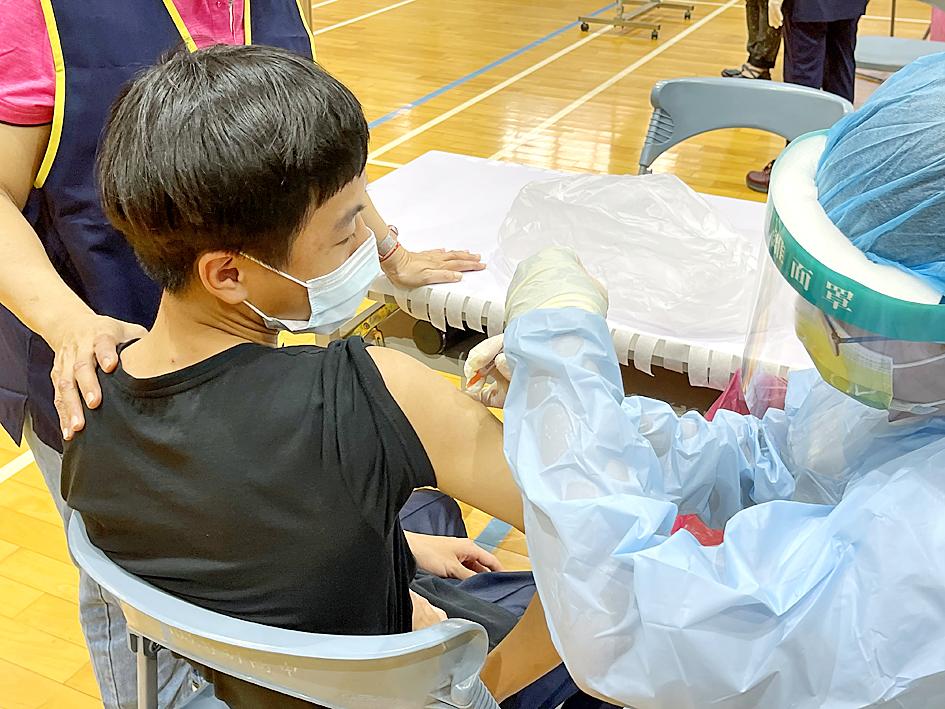The Central Epidemic Command Center (CECC) is planning to launch an expanded COVID-19 vaccination program next month to reach a full vaccination coverage rate of more than 60 percent by the end of the year, Minister of Health and Welfare Chen Shih-chung (陳時中) said yesterday.
Chen, who heads the CECC, made the announcement during a question-and-answer session at the legislature in Taipei alongside Premier Su Tseng-chang (蘇貞昌).
Chinese Nationalist Party (KMT) Legislator Chiang Wan-an (蔣萬安) asked whether the government’s strategy is to achieve “COVID-19 zero” or “to coexist with COVID-19,” as the strategy would affect regulations.

Photo: Su Meng-chuan, Taipei Times
“At present, Taiwan is actually very safe, as border control measures and local contact tracing have been conducted thoroughly, so the goal is to achieve ‘COVID-19 zero,’” Su said.
He said if the COVID-19 situation in Taiwan remains under control and if the virus does not undergo a major mutation, then COVID-19 might gradually become like the seasonal flu and the goal could then be “to coexist with COVID-19.”
“The current goal is to achieve COVID-19 zero, but Taiwan must also be prepared to coexist with COVID-19,” Chen said, adding that the CECC’s measures aim to build “resilience” in disease prevention — finding a balance between levels of restrictions while avoiding pandemic fatigue, and reducing harm to the economy.
Asked by Chiang when the government expects to achieve herd immunity, Chen said that “no one talks about achieving herd immunity nowadays, but rather how vaccination can reduce severe COVID-19 and death. The center’s goal is to achieve a full vaccination coverage rate of more than 60 percent by the end of the year.”
He said the short-term goal is to achieve a first-dose vaccination coverage rate of more than 70 percent and a full vaccination coverage rate of more than 30 percent by the end of this month.
Chiang also asked about the criteria for lowering a nationwide level 2 COVID-19 alert and when the center expects to meet them.
There are a few aspects that must be taken into consideration, Chen said, including the number of new locally transmitted cases with unclear infection sources, the responsiveness of the healthcare system, the full vaccination rate of people aged 65 or older and high-risk people, the public’s compliance level with the guidelines and changes in the global COVID-19 situation.
It is difficult to predict when the alert level would be lowered, but the criteria are being discussed with specialists, he said.
Chiang said that while more than 720,000 people in Taiwan have received the COVID-19 vaccine produced by Taiwanese firm Medigen Vaccine Biologics Corp (高端疫苗), the brand is not recognized by the US, which next month is to require international visitors to be vaccinated to enter the nation.
People from Taiwan have not been banned from entering the US in the past year and Taiwan has not been listed as a high-risk area for COVID-19 infection, Chen said, adding that the government would continue negotiating with the US government on the issue.

MAKING WAVES: China’s maritime militia could become a nontraditional threat in war, clogging up shipping lanes to prevent US or Japanese intervention, a report said About 1,900 Chinese ships flying flags of convenience and fishing vessels that participated in China’s military exercises around Taiwan last month and in January have been listed for monitoring, Coast Guard Administration (CGA) Deputy Director-General Hsieh Ching-chin (謝慶欽) said yesterday. Following amendments to the Commercial Port Act (商港法) and the Law of Ships (船舶法) last month, the CGA can designate possible berthing areas or deny ports of call for vessels suspected of loitering around areas where undersea cables can be accessed, Oceans Affairs Council Minister Kuan Bi-ling (管碧玲) said. The list of suspected ships, originally 300, had risen to about 1,900 as

Japan’s strategic alliance with the US would collapse if Tokyo were to turn away from a conflict in Taiwan, Japanese Prime Minister Sanae Takaichi said yesterday, but distanced herself from previous comments that suggested a possible military response in such an event. Takaichi expressed her latest views on a nationally broadcast TV program late on Monday, where an opposition party leader criticized her for igniting tensions with China with the earlier remarks. Ties between Japan and China have sunk to the worst level in years after Takaichi said in November that a hypothetical Chinese attack on Taiwan could bring about a Japanese

Right-wing political scientist Laura Fernandez on Sunday won Costa Rica’s presidential election by a landslide, after promising to crack down on rising violence linked to the cocaine trade. Fernandez’s nearest rival, economist Alvaro Ramos, conceded defeat as results showed the ruling party far exceeding the threshold of 40 percent needed to avoid a runoff. With 94 percent of polling stations counted, the political heir of outgoing Costa Rican President Rodrigo Chaves had captured 48.3 percent of the vote compared with Ramos’ 33.4 percent, the Supreme Electoral Tribunal said. As soon as the first results were announced, members of Fernandez’s Sovereign People’s Party

MORE RESPONSIBILITY: Draftees would be expected to fight alongside professional soldiers, likely requiring the transformation of some training brigades into combat units The armed forces are to start incorporating new conscripts into combined arms brigades this year to enhance combat readiness, the Executive Yuan’s latest policy report said. The new policy would affect Taiwanese men entering the military for their compulsory service, which was extended to one year under reforms by then-president Tsai Ing-wen (蔡英文) in 2022. The conscripts would be trained to operate machine guns, uncrewed aerial vehicles, anti-tank guided missile launchers and Stinger air defense systems, the report said, adding that the basic training would be lengthened to eight weeks. After basic training, conscripts would be sorted into infantry battalions that would take